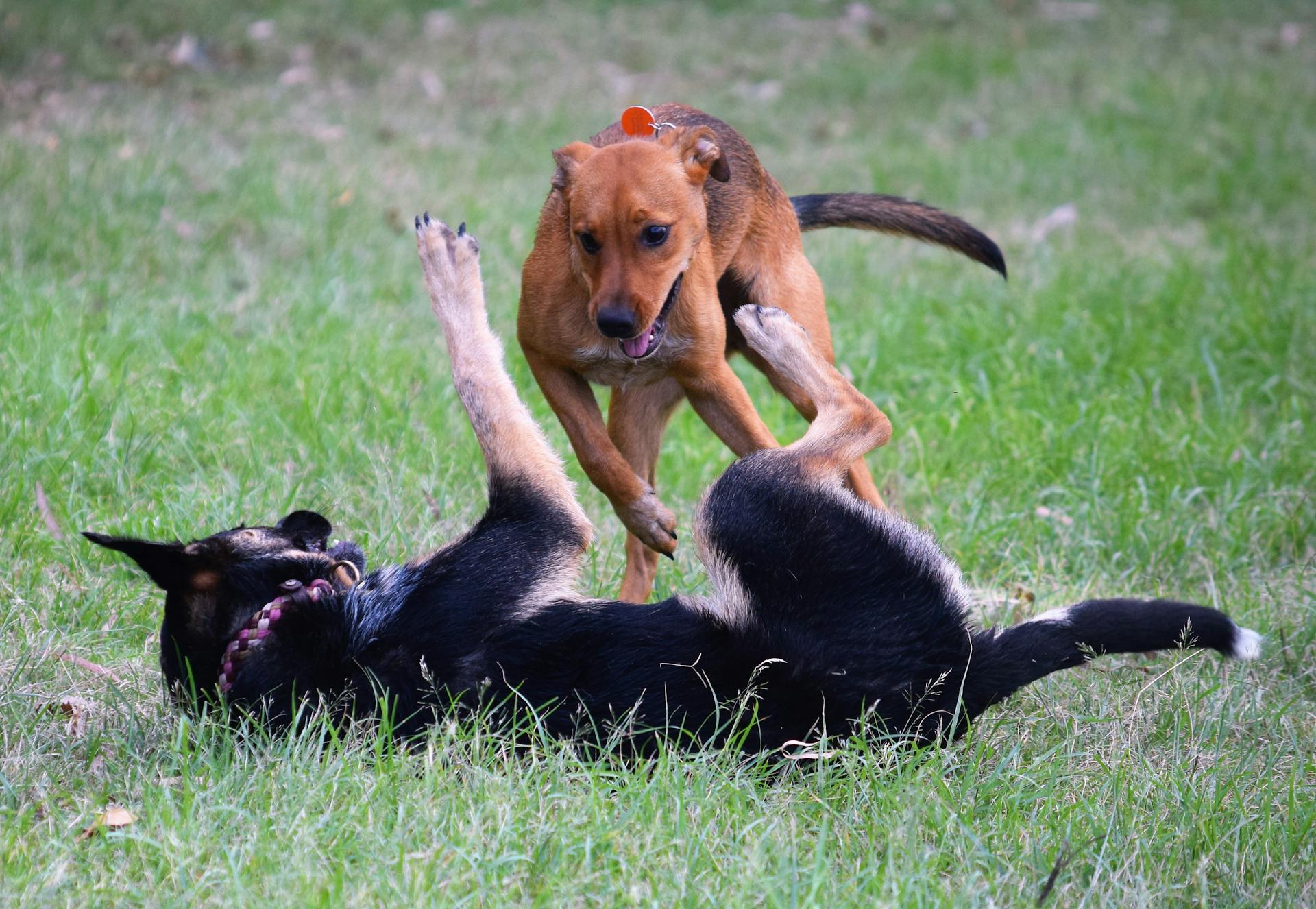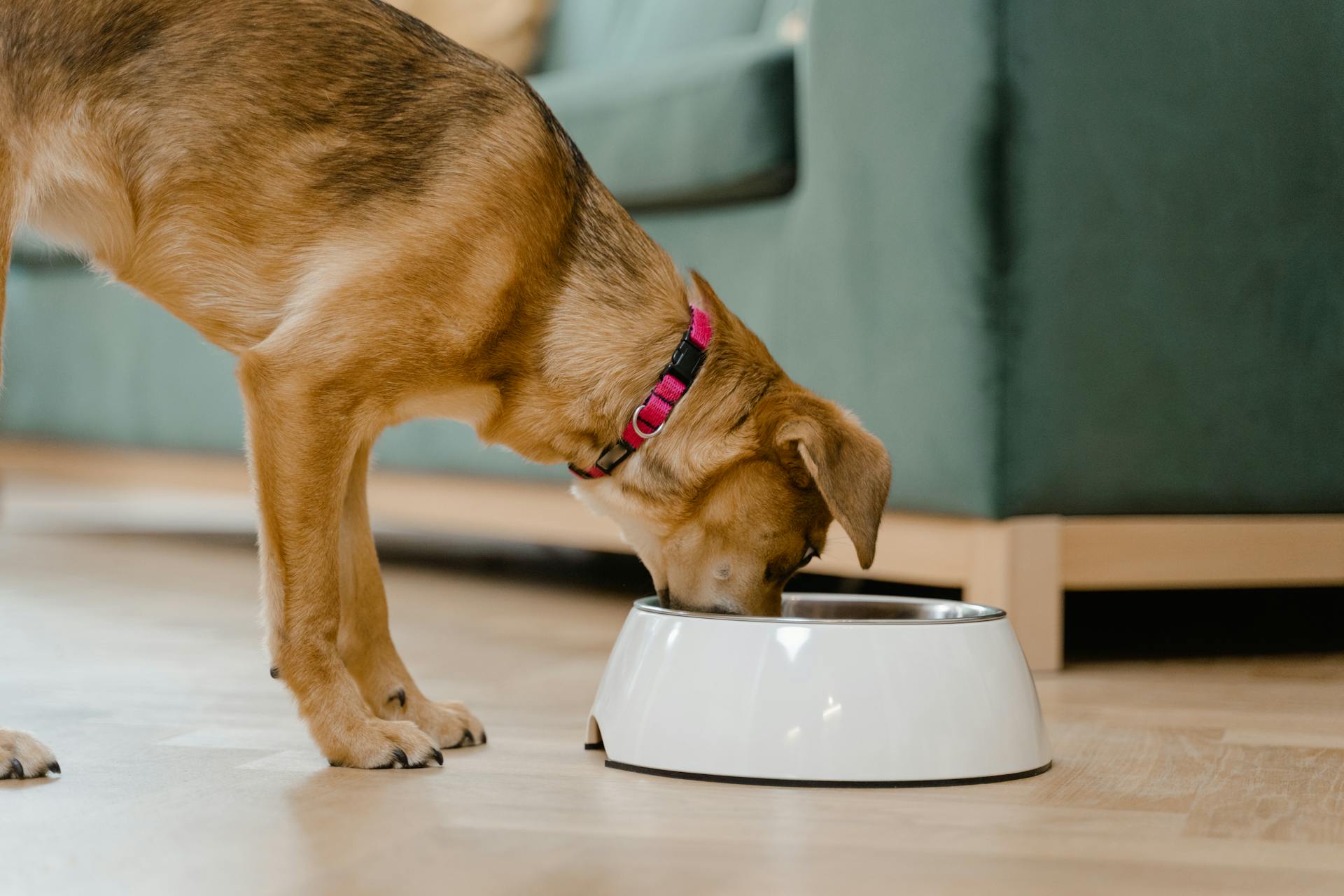
Pancreatitis in dogs is a serious condition that requires immediate attention. High-fat foods can trigger a pancreatitis episode in some dogs.
Fatty meats like pork, lamb, and beef are common culprits. These foods can cause a sudden spike in triglyceride levels, leading to pancreatitis.
Dogs with pre-existing conditions like obesity or diabetes are more susceptible to pancreatitis. Feeding them high-fat foods can be a recipe for disaster.
A balanced diet rich in fiber and low in fat is essential for maintaining a healthy pancreas. This helps prevent pancreatitis episodes and supports overall well-being.
Here's an interesting read: Dog Food for High Energy Dogs
Causes and Prevention
Causes of pancreatitis in dogs are often unexpected, but there are certain risk factors to be aware of. A high-fat diet is a major cause, especially if your dog gets one large helping of fatty food in one sitting.
A history of dietary indiscretion, or eating anything they can get their paws on, can also lead to pancreatitis. Obesity is another risk factor, making it even more crucial to monitor your dog's weight.
Hypothyroidism and other endocrine diseases can increase the risk, as can severe blunt trauma. Certain medications or toxins, including cholinesterase inhibitors and phenobarbital, can also cause pancreatitis.
Some breeds, such as Miniature Schnauzers and smaller toy and terrier breeds, may be more prone to pancreatitis due to a genetic predisposition.
To prevent pancreatitis, it's essential to refrain from feeding your dog table scraps and high-fat foods. This is especially important around holidays, when well-meaning guests may slip your dog a fatty treat.
Here are some common high-fat foods to avoid:
- Fatty meats, such as lamb or buttery cookies
- High-fat dog food, especially if fed in excess
Dogs with underlying health conditions, such as Cushing's disease, are at an increased risk of pancreatitis. Regular follow-up appointments and adhering to prescribed medications can help reduce this risk.
Symptoms and Diagnosis
Pancreatitis in dogs can be a serious condition that requires prompt attention from a veterinarian. If your dog is showing symptoms of pancreatitis, it's essential to seek veterinary care as soon as possible.
Common symptoms of pancreatitis in dogs include decreased or absent appetite, nausea and vomiting, abdominal pain, and abdominal distention. Your dog may also exhibit abnormal poop or diarrhea, fever, lethargy or weakness, and dehydration.
A veterinarian will typically begin treatment based on clinical signs alone, but may also recommend diagnostic testing to rule out other health conditions with similar symptoms. Diagnostic tests may include ultrasound, bloodwork, blood tests for pancreatic enzymes, radiographs, and ultrasound.
Signs and Symptoms
If your dog is showing signs of pancreatitis, it's essential to act quickly. Pancreatitis can be a life-threatening condition, especially if left untreated.
Common signs of pancreatitis in dogs include decreased or absent appetite due to abdominal pain and nausea. Abdominal pain can range from mild to intense, and dogs may exhibit behaviors like yelping when their abdomen is touched or assuming a "praying position."
Nausea and vomiting are also common symptoms of pancreatitis in dogs. In fact, dogs with pancreatitis often experience episodes of nausea and repetitive vomiting. Abdominal distention, or bloating, may also be present in some cases.
Related reading: Pain Relief for Pancreatitis in Dogs

Dogs with pancreatitis may also exhibit abnormal poop or diarrhea, which can be greasy or severe. Fever is another common symptom, often accompanied by inflammation. Dehydration is a serious concern, especially if diarrhea and vomiting are present.
Here are some common symptoms of pancreatitis in dogs:
- Vomiting
- Decreased appetite
- Abdominal pain
- Diarrhea
- Lethargy
- Dehydration
If your dog is showing these symptoms, it's crucial to seek veterinary care as soon as possible. Even if symptoms seem mild, it's always best to consult with a vet to determine the best course of action.
Discover more: Best Food for Gassy Dogs
Diagnosing
Diagnosing pancreatitis in dogs can be tricky because the symptoms may not be specific or severe. Diagnosing pancreatitis requires a veterinarian to examine your dog for signs of abdominal pain and dehydration. A thorough physical exam is crucial in identifying potential issues.
A veterinarian will often begin treatment based on clinical signs alone, but diagnostic testing is still important to rule out other health conditions with similar symptoms. Bloodwork, which measures blood cells, blood sugar, electrolytes, and organ function parameters, is an essential part of the diagnostic process.

Blood tests for pancreatic enzymes can help diagnose pancreatitis. A very specific test called canine pancreatic lipase immunoreactivity (cPLI) can be used, but even this test might not be accurate in all dogs. A negative cPLI test makes it very unlikely that your dog has pancreatitis, but not impossible.
Radiographs and ultrasound may be used to rule out other conditions and assess the size of the pancreas and nearby organs. Imaging tests can show inflammation or other changes in some dogs with pancreatitis.
Here are some common diagnostic tests used to diagnose pancreatitis:
- Ultrasound: generally considered the best diagnostic tool to determine if your pet has signs of pancreatitis
- Blood tests: including blood tests for pancreatic enzymes, such as canine pancreatic lipase immunoreactivity (cPLI)
- Radiographs and Ultrasound: to rule out other conditions and assess the size of the pancreas and nearby organs
In some cases, a biopsy may be necessary to definitively diagnose pancreatitis. This is usually done through surgery, but it's often impractical to perform in a patient who's ill.
Treatment and Recovery
Managing your dog's pain is crucial when they're dealing with acute pancreatitis. Early intervention is key to prevent further complications.
Intravenous (IV) fluid therapy is often used in severe pancreatitis cases to help your dog recover. Vigilant monitoring of their condition is also essential to catch any worsening symptoms early.
Antiemetic medication can help prevent dehydration caused by vomiting, which is a common symptom of pancreatitis. Resting the pancreas by withholding food and water for 24 hours can also help give it a chance to heal.
Long-term management of pancreatitis involves making some significant changes to your dog's diet. You'll need to be vigilant about monitoring their fat intake, which means no table scraps allowed! A prescription diet of low-fat or ultra-low fat food can help support their gastrointestinal health.
Feeding smaller, more frequent meals instead of one large meal can also help ease the pancreas's workload. Regular check-ups with your veterinarian to monitor amylase and lipase levels are also crucial to ensure your dog's pancreas is healing properly.
See what others are reading: Can I Crack an Egg in My Dog's Food?
Understanding Pancreatitis
Pancreatitis is a painful and potentially life-threatening condition that affects many dogs. It's essentially inflammation of the pancreas, which can be triggered by various factors, including genetics, obesity, and certain food ingredients.
The pancreas plays a vital role in digestion and glucose regulation, so when it becomes inflamed, it can cause a range of symptoms, including vomiting, diarrhea, and abdominal pain.
Dogs with pancreatitis often experience a sudden onset of symptoms, which can be severe and even lead to life-threatening complications if left untreated.
Some breeds are more prone to pancreatitis due to their genetic makeup, with Miniature Schnauzers, Cocker Spaniels, and Yorkshire Terriers being among the most susceptible.
Obesity is a significant risk factor for pancreatitis in dogs, as excess weight can put additional strain on the pancreas and lead to inflammation.
A diet rich in fat and sugar can also contribute to pancreatitis, as these ingredients can cause inflammation and damage to the pancreas.
Helping Your Dog
Every dog has unique needs, so be sure to check with your veterinarian prior to beginning any diet changes.
While pancreatitis can be a scary condition, it’s possible for most dogs who develop the condition to live normal lives — and enjoy a great quality of life, with all their favorite activities — so long as appropriate treatment and management are implemented.
Sources
- https://www.akc.org/expert-advice/health/pancreatitis-in-dogs/
- https://www.petmd.com/dog/conditions/endocrine/pancreatitis-in-dogs
- https://bondvet.com/b/pancreatitis-in-dogs
- https://www.ethosvet.com/blog-post/pancreatitis-in-dogs-what-you-need-to-know/
- https://bettervet.com/resources/pet-health-care/pancreatitis-in-dogs
Featured Images: pexels.com


